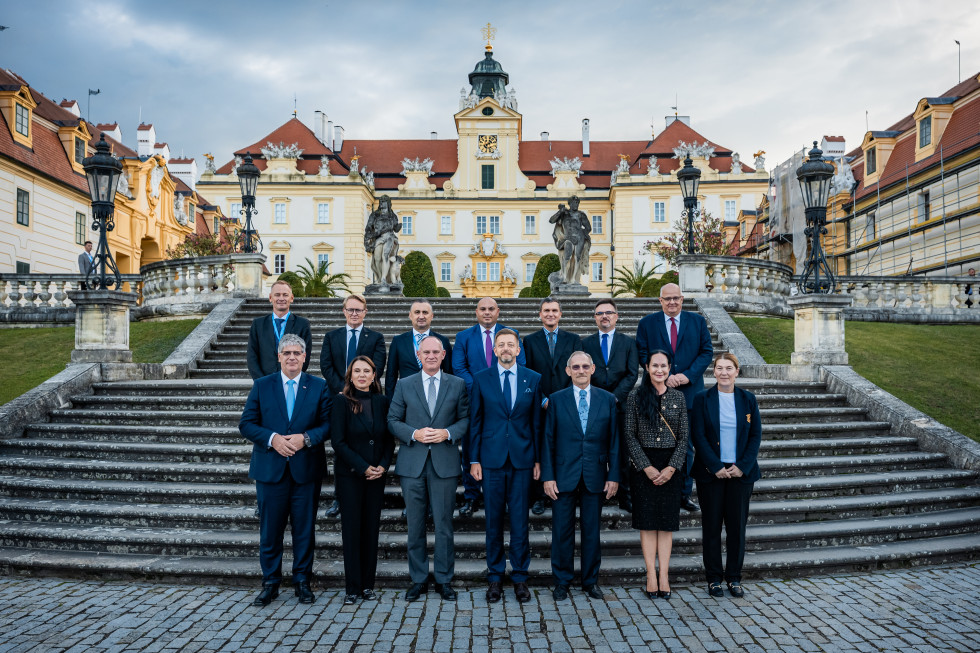Minister Poklukar attends the Salzburg Forum in Czechia
The ministers discussed the prevention of peer violence and threats in schools, migration and the situation in Ukraine, as well as the fight against drug smuggling.
As Minister Poklukar said at the press conference, he particularly welcomed the discussion on peer violence and threats in schools, with the ministers exchanging valuable experiences and practices. This was also the main topic of discussion between Minister Poklukar and his Czech counterpart Vít Rakušan at yesterday's bilateral meeting, where they confirmed the excellent cooperation between the ministries and police forces of both countries.
The experiences of Czechia and Austria following the tragic attacks on Prague University and a school in Graz serve as a reminder to interior ministers that no country is immune to such attacks, and that it is therefore necessary to share experiences and do everything possible to ensure that schools remain safe places. The minister also stressed the importance of properly training school staff to prevent such incidents or, if they do occur, to know how to respond appropriately and protect themselves and students.
In Slovenia, we have made significant progress in this area, which is one of Minister Poklukar's main priorities, and above all, achieved a high level of awareness among various stakeholders (especially in education) of the importance of responding appropriately to violent incidents, and in particular of prevention and preparedness.
In 2024, the Republic of Slovenia adopted a Resolution on the National Programme for the Prevention of Domestic Violence and Violence against Women, and the Slovenian Police have a national action plan for domestic violence, with a special focus on children and peer violence. One of the strategic objectives is for the Police, in cooperation with other stakeholders, to actively implement the action plan of the Ministry of the Interior and the Police to prevent and address peer violence.
A Threat Notification and Response Protocol for Educational Institutions has been prepared by the Ministry of the Interior and the Police and signed with the Ministry of Education and the Ministry of Higher Education, Science and Innovation, and is an important document. It contains protection measures in the event of threats to children or employees in educational institutions, based on the level of threat. The Police are often the first responders in such cases of violence, but close inter-institutional cooperation and immediate response by all competent services are of utmost importance in dealing with this problem.
Practical training provided by the Police for teachers in kindergartens and primary and secondary schools on recognizing the symptoms of violence is also essential. The aim of the training is to ensure effective action in accordance with the protocol and preparedness for active life-threatening events, such as AMOK situations and other similar security threats.
To successfully prevent violence, it is essential that all relevant ministries that can contribute to the safety and education of children work together. It is also important to exchange information and practices at the strategic level. The task of all stakeholders is to act quickly and effectively and to ensure that the entire process has an educational effect on the child.
During the panel discussion on migration, Minister Poklukar told his colleagues that Slovenia is currently in the midst of the most intensive phase of preparations for the implementation of the Migration and Asylum Pact in mid-2026. The key guideline here is to implement the rules as effectively as possible in practice, which is why we support any simplification of administrative burdens, and the same applies to the future financial framework. He expressed his expectation that the upcoming European Migration Strategy will reflect the following priorities: cooperation with third countries in migration management, a strengthened fight against migrant smuggling, effective asylum procedures, enhanced returns, and addressing new threats, including the instrumentalization of migration. At the same time, he expressed reservations about the introduction of innovative solutions, in particular the so-called return hubs, in the Western Balkans. He stressed that solutions to illegal migration must be common, while praising the efforts of Magnus Brunner, Commissioner for Internal Affairs and Migration.
The situation in Ukraine, which was another topic discussed by the ministers, remains unstable. There is still a risk of additional pressure on the asylum and reception systems of Member States if displaced persons were to suddenly apply for international protection in great numbers. In shaping future measures, it is crucial to continue to closely monitor developments and the situation in Ukraine and to cooperate closely with Ukraine. A coordinated approach by Member States at EU level will also be important with regard to the termination of temporary protection for displaced persons from Ukraine and the appropriate transition to other legal bases for residence that will allow for continued stay in Member States.
Ministers also discussed illicit drug trafficking, a dynamic global criminal business that affects all Member States. Slovenia is also adapting to changing methods of illicit drug production and changing smuggling routes. We therefore welcome all initiatives, such as the new EU action plan to combat drug trafficking, the establishment of the European Ports Alliance, and the adoption of joint measures against corruption and the infiltration of criminal organizations. However, in order to respond effectively to organised crime activities, it is essential to strengthen cooperation between the competent authorities and to strengthen public-private partnerships.
On the sidelines of the meeting, Minister Poklukar also spoke with his Austrian counterpart Gerhard Karner and expressed his protest against the disproportionate use of police force against participants in an anti-fascist camp in July this year at the Peršman Homestead in Železna Kapla/Eisenkappel in Carinthia, Austria. Minister Karner assured Minister Poklukar that the commission set up by the Austrian Ministry of the Interior would do its job and investigate the incident, which Minister Poklukar described as an unacceptable expression of disrespect towards the Slovenian minority.

Group photo | Author Ministry of the Interior of the Czech Republic

